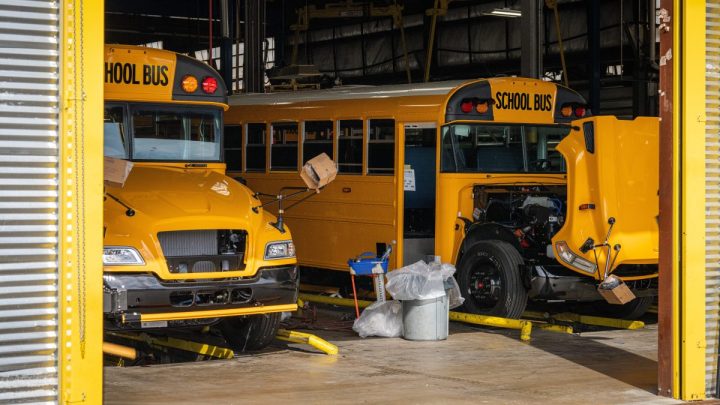
A rural Georgia school bus company goes big on EVs

Picture kids heading off to school, an early morning group toting backpacks, sports gear and lunchboxes, waiting by the side of the road as the big yellow school bus pulls up with a roar.
But in school districts around the country, the sound of the bus is instead increasingly the artificial hum of an electric vehicle.
A shift toward electric school buses is getting a boost from a $5 billion federal pot of money meant to help address air pollution and climate change by helping school districts buy low- and zero-emissions buses.
Many of these new, quieter, cleaner school buses are built in Georgia by the 95-year-old Macon-based Blue Bird Corp. at its plant in the nearby town of Fort Valley.
“These are the batteries right here,” said Antonio Bryant, a trainer in the EV factory.
“Pretty much everyone that comes through here, I have a little hand in training them,” he said.
Electric buses are a growing focus for the company, according to Britton Smith, Blue Bird senior vice president of electrification and chief strategy officer. About 6% of the company’s volume is electric now, but he said he expects that to grow significantly.
“The momentum has changed,” Smith said. That’s thanks to public funding aimed at tackling climate change and air pollution.
Smith said that Blue Bird will sell roughly $1 billion worth of electric school buses because of the $5 billion coming from the 2021 bipartisan infrastructure law.
“What’s interesting about it is that we’re seeing orders from states that you would not expect,” he said. Like Kentucky, Utah and Nevada.
Currently, Blue Bird has the capacity to manufacture four electric buses a day. But the company is building out a facility to be able to build as many as 20 a day by the end of this year.
“For us, it’s a pretty exciting time in our history,” Smith said.

There’s also potentially changes coming for the workers. They recently voted to unionize, asking for better pay, work-life balance and safer conditions. The United Steelworkers says that with the company benefiting from federal incentives, it’s only fair that the workers do too.
It’s also notable that Blue Bird is profitable with electric buses, said Mike Shlisky, a senior research analyst at D.A. Davidson specializing in the EV sector.
“There’s a lot of a lot of flash and a lot of new companies no one’s heard of before and a lot of capital being raised and things along those lines,” he said. “But the company that’s actually doing just as good as all of them, if not better, is Blue Bird.”
Blue Bird trainer Antonio Bryant said he can see his handiwork on the roads. His dad works in a rural Georgia school system and recently told him his district is getting an electric bus from his factory.
“I do this so my hometown gets one that I actually built,” he said.
And what if his dad gets to drive one of his buses? Bryant said that is kind of cool.
There’s a lot happening in the world. Through it all, Marketplace is here for you.
You rely on Marketplace to break down the world’s events and tell you how it affects you in a fact-based, approachable way. We rely on your financial support to keep making that possible.
Your donation today powers the independent journalism that you rely on. For just $5/month, you can help sustain Marketplace so we can keep reporting on the things that matter to you.











